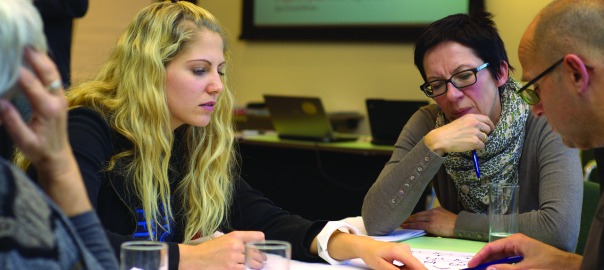When I talk about election violence in the United States, people sometimes ask the question, “What are you worried about, exactly? What do you think is going to happen?” This is not something that’s predictable. Even full-time, professional peacebuilders who specialize in election violence prevention do not have the ability to make accurate predictions about the nature or severity of future election violence.
But there are some reliable warning signs, a set of conditions that—in retrospective analysis of elections with and without violence in various countries—tend to indicate that election violence more or less likely. As a reminder, “election violence” is a technical term in the peacebuilding field. It means physical violence, severe psychological violence (such as repeated threats), or destruction of property of monetary or symbolic value that is either motivated by or intended to influence an election cycle.
I want to talk to you about the three most common warning signs: what they are, how we recognize them, why they matter, and what types of actions or changes might mitigate them.
Common warning sign #1: a recent history of election violence. The more recent and more severe the country’s history of election violence, the more likely it is that election violence will occur again in the near future. We know the United States has experienced election violence to varying degrees in connection with the 2020 and 2022 election cycles, and we are already experiencing it in connection with the 2024 election cycle. The strongest current example is repeated and severe threats being made to election officials.
In all cases of election violence, the biggest concern is a cascade effect: one incident leads to another, which makes ripples, and we wind up with a situation that is wildly out of control. This is part of why a recent history of election violence makes more election violence more likely in the near future. The myth of redemptive violence is strong. Many people believe that the only potentially effective response to violence is equal violence in the opposite direction. Another reason that recent history is predictive is humans’ capacity for adjusting our views on what is “normal.” Because we aren’t able, psychologically, to live in a state of extraordinary alarm long-term, we tend to adjust our internal baseline. The more election violence we have, the more people begin to feel that a certain amount of election violence is normal and possibly even acceptable.
In the 1660 Declaration to the King, Friends declared that “wars and fightings proceed from the lusts of men.” Generally speaking, people are violent when they want something and believe that violence is their best of chance of getting it. For that reason, election violence prevention strategies emphasize making nonviolent political expression an easier choice than violence. Through peace messaging, civic and voter education, voter consultations, and youth programming, election violence prevention highlights and encourages alternatives to violent action.
Common warning sign #2: politicians’ use of blame-based rhetoric. This one is complex but crucial. Blame-based rhetoric is the expression of ideas in a way that that encourages fear and anger about something without offering any solution. The contrasting expression of ideas is problem-solution rhetoric.
I’ll give two examples—first conservative, then liberal.
If I am a conservative politician using blame-based rhetoric, I might say something like this: “Democrats want to throw open our borders and leave us vulnerable to terrorists and criminals.” When I say this, I encourage my conservative listeners to fear and abhor Democrats, terrorists, lawbreakers, and immigrants.
If I am the same conservative politician using problem-solution rhetoric, I might say something like this instead: “We have a real problem with national security. I suggest stronger background checks during immigration and visa processes, plus modifications to our asylum laws.” Now I’m suggesting a potential way forward.
If I am a liberal politician using blame-based rhetoric, I might say something like this: “Republicans, especially religious conservatives, hate women and want to force everyone to abide by their own outdated religious ideals.” When I say this, I encourage my liberal listeners to fear and abhor Republicans, Christians, and people with what some might call old-fashioned moral frameworks.
If I am the same liberal politician using problem-solution rhetoric, I might say something like this instead: “It is very important that we preserve a woman’s right to choose. I suggest we pass federal legislation to prevent states from restricting abortion access.” Again, this is a potential way forward.
Unfortunately, politicians and candidates have discovered that blame-based rhetoric is effective for winning campaigns. Frightened, angry people are very likely to vote for the person who most agrees with their own perspective. That feels relatively safe. Problem-solution rhetoric, on the other hand, leave the politician open to criticism. Suppose that someone disagrees with their solution and therefore doesn’t vote for them?
It’s not good when any of us use blame-based rhetoric, but it’s especially destructive when politicians do it. The implied lesson is (1) the “other” is extremely threatening and (2) the only possible solution is to defeat or utterly destroy the opposition. People who are sufficiently frightened and angry and who do not believe that the election process provides any hope become more likely to participate in violence.
To prevent election violence, we can disrupt this pattern in two ways.
First, we can recognize, interrupt, and dismantle politicians’ use of blame-based rhetoric. If we want to push back on politicians themselves, we can listen for it and send emails or messages to their offices. “I notice that __________ said ___________ in yesterday’s speech, and I want to point out that this is a very dangerous way to talk about the issue. I also find it unsatisfying as a voter; what is _________’s suggested solution?”
But it can also be helpful to interrupt the patterns with our fellow listeners. “Did you notice that ___________ is blaming _________ for that problem but didn’t actually offer a solution? I’m not so sure that’s helpful. What do you think the solution might be?”
Second, we can refuse to fear people that we don’t know. We can ask ourselves, “What category of people is _____________ trying to make me fear? Do I have a personal relationship with anyone who fits into that category? Do they really meet that stereotype?” And if we don’t know anyone in that category, we can reach out and start building personal relationships. This is also an early step in creating resilient communities, which is a major part of election violence prevention. More on that another day.
Quakers know experientially that the Holy Spirit is capable of speaking through everyone. That doesn’t mean that people aren’t capable of choosing to do evil. Of course they are. But no one is worth dismissing or hating on the basis of category without a personal relationship, as 1 Corinthians 12 reminds us.
Common warning sign #3: people doubting the government’s legitimacy. More than 60% of Republicans do not believe that President Biden was legitimately elected. Around 70% of Democrats believe the Supreme Court is partisan rather than impartial. (This is not quite the same thing as believing the Supreme Court is illegitimate, but I could not find data on that specific question.)
Whether our government is or isn’t legitimate is enormously important, but it’s also worth noting here that the problem when we’re talking about election violence isn’t whether the government is legitimate but whether the people doubt that it is. People who don’t believe that their country’s election process results in legitimately elected candidates are much more likely to engage in election violence because they don’t have faith in the nonviolent process.
To prevent election violence, we have to make sure that elections are fair and are perceived as fair, which means working on both election administration and election monitoring. The Braver Angels Trustworthy Elections group has just released a report that I find extremely compelling. The content is good; the process used to produce it is better.
Generally speaking, in the United States, liberals believe that our elections have an access problem while conservatives believe that our elections have a security problem. These problems are often viewed as mutually exclusive—that is, we can’t improve access without reducing security and vice versa.
The Braver Angels Trustworthy Elections group wondered whether this was true. Over the course of several years, they gathered many half-conservative, half-liberal groups to talk about their concerns about elections. Each workshop group wrote and approved lists of statements and recommendations that had to approved word-for-word unanimously. Then, the total list of statements and recommendations was synthesized into the report and recommendations just released. The group that did this synthesizing work was also half-liberal, half-conservative, and they had to both unanimously approve the report and base everything in the report on data from the completed workshops.
Sunday evening, I attended an online conversation in which four members of the synthesis group talked about their experiences producing this report. They said several things that were really striking.
Deep listening seemed to be key at every step. I had to consider the possibility that anybody could be bringing something true and important.
This report was not about compromise. It was about understanding the sense of the whole group. Sometimes I could see that something needed to happen even though I didn’t agree with it because of how important it was to the other people. I discovered I could affirm the necessity of certain recommendations even though I would never have come up with them myself.
I learned to trust the rest of the group. If I truly believed that something was absolutely wrong, the rest of the group wouldn’t pressure me into it.
The process itself changed me. I believe in and affirm what came out of this work, even though it isn’t where I started.
Do you recognize this? I do. It’s really, really good corporate discernment.
If people in this country are going to trust our elections, their concerns will have to be addressed. All of them—which means we have to stop pushing in opposite directions. The report from Braver Angels is a good place to start.
We also prevent election violence when we serve as poll workers and support election monitoring efforts. Again, it’s about making sure that elections are run fairly and are perceived as being run fairly.
Will you join me in talking more about these things? You can add yourself to a mailing list here.









